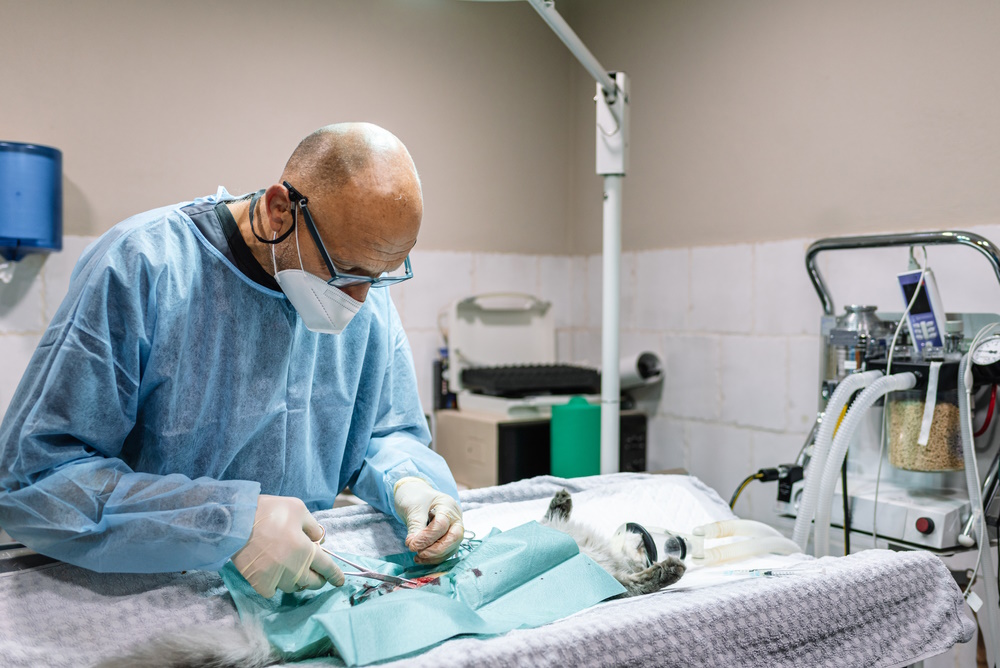Neutering or spaying your cat is a crucial part of responsible pet ownership. It prevents accidental litters, some behavioral problems, and reproductive conditions and ensures you don’t contribute to overpopulation. However, a neutered male cat can still get a female cat pregnant postoperatively if you don’t take the proper measures.
What’s Involved in Neutering a Cat?
Neutering a cat means castrating them to remove their ability to reproduce. This involves removing both testes under general anesthesia using a small incision in the scrotum. Neutering is a routine and simple procedure that prevents unwanted litters, health issues, and problem behaviors.
In female cats, the procedure to “fix” them is spaying, which involves removing the reproductive organs under general anesthesia. While a more invasive surgery with a longer recovery time, spays are routine and common practices to prevent mating, behavioral problems, and reproductive health problems.

How Can Neutered Cats Still Mate?
Generally, neutering a cat is a way to prevent them from impregnating intact (unspayed) female cats. However, sterilization doesn’t happen immediately after surgery. The testicles that produce sperm have been removed during surgery, but male cats can retain some sperm in the vas deferens, or the tubes that transport sperm to the urethra, for a period after surgery.
In addition, testosterone, the primary sex hormone in male cats, can remain for a period after neutering. Once the testicles are removed, the testosterone should decrease over time. However, it can take weeks after surgery, and combined with the residual sperm, the male could potentially impregnate a female for a period of time.
Will a Neutered Male Cat Try to Mate?
A neutered male cat will have sexual urges after neutering, but he won’t necessarily be able to. Testosterone still fuels the desire to reproduce, but he can’t produce sperm without intact testicles.
If the female cat is in heat, the male may become aroused and mount her. If this occurs close to neutering, residual sperm may impregnate the female. It’s crucial to keep the neutered male and intact female separated until the leftover testosterone and sperm have cleared their system.

How Long Does It Take for Neutered Cats to Lose Hormones and Sperm?
It is generally believed that it can take four to six weeks for the residual testosterone and sperm to clear a cat’s system. It’s a good practice to keep your neutered cat indoors and separated from intact female cats for that period.
Or better yet, spay your female cat and keep all your cats indoors. Spaying your female cat ensures that there’s no possibility of pregnancy with an intact or neutered male and no heat to cause arousal and mounting. Ideally, your cats should be indoors to prevent unwanted litters and injuries or death that can occur from conflict with other cats, wildlife, humans, and vehicles.
Why Should I Neuter My Male Cat?
Neutering your male cat is responsible pet ownership. Unless you have breeding stock, neutering your male cat helps control the crisis of unwanted pets and overpopulated shelters. Millions of healthy cats are euthanized because there aren’t enough owners, and feral cat populations are out of control in many areas across the US.
But aside from that, neutering your cat has benefits for you and them. Removing your male cat’s testicles prevents testicular cancer. It also prevents some problematic behaviors like roaming, spraying urine, mounting female cats, and some types of aggression. Neutering is a simple, inexpensive, and straightforward procedure that pays off in the long run.
Conclusion
Neutering your male cat is an important part of preventing litters if there’s an intact female cat around, but there’s still a mating window after the surgery. For about four to six weeks, your male cat can have some residual hormones and sperm that can impregnate a female cat if she is in heat and he mounts her. It’s best to fix all your animals and keep your male cat indoors and away from intact females until the sperm and hormones have cleared his body.
Featured Image Credit: Bachkova Natalia, Shutterstock









